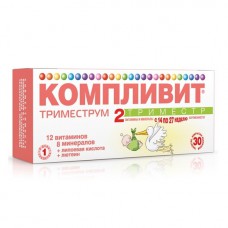Expiration date: 04/2026
Pharmacological action
Combined multivitamin preparation with micro - and macro-elements, the compatibility of components in 1 pill is secured by special technology of production of vitamin-mineral complexes.
This vitamin and mineral complex designed specifically taking into account changes in the needs of woman's body in vitamins and minerals at different stages of pregnancy. The effect of the drug COMPLIVIT Trimestru 2 trimester due to the effects of its constituent components:
Vitamin a (retinol)- needed for bone growth, normal reproductive function, for the regulation of division and differentiation of the epithelium of the toos, and also for the normal function of eye retina. Retinol is involved in the formation of the visual organ and of the skeleton during fetal development.
Vitamin E (a-tocopherol) has an antioxidant effect: inhibits the reaction of free radicals and oxidation of unsaturated fatty acids, prevents the formation of peroxides that damage cellular membranes. Promotes normal growth and development of the fetus, reduces the risk of hypertension during pregnancy.
Vitamin B1 (thiamine)- plays an important role in protein, carbohydrate and fat metabolism and in the processes of nervous excitation in the synapses. Involved in carbohydrate metabolism and in the synthesis of nucleic acids, proteins and lipids. During pregnancy thiamine reduces the risk of congenital malformations in the fetus.
Vitamin B2 (Riboflavin)- regulates the redox processes involved in tissue respiration, carbohydrate, protein and fat exchanges, as well as in the synthesis of hemoglobin and erythropoietin. Necessary for normal growth and development of the fetus. Lack of Riboflavin during pregnancy causes fetal abnormalities: deformation of the limbs, splitting the hard palate, hydronephrosis, hydrocephalus, congenital malformations of the heart.
Vitamin B6 (pyridoxine) is involved in metabolism; necessary for normal functioning of the Central and peripheral nervous system. Prevents nausea and vomiting during morning sickness in pregnant women due to the normalization of the function of the nervous system. Promotes absorption of magnesium in the intestine. With a lack of pyridoxine increases the risk of developing preeclampsia, anemia, water shortage.
Vitamin C (ascorbic acid) is involved in the regulation of redox processes, carbohydrate metabolism, blood coagulation, tissue regeneration; increases the body's resistance to infections. Lack of vitamin C increases the risk of premature pregnancy termination. The need for vitamin C increases during 2nd and 3rd trimester of pregnancy. Nicotinamide (vitamin PP) is involved in the metabolism of fats, proteins, purines, tissue respiration. Reduces the risk of fetal malformations.
Folic acid is involved in the synthesis of amino acids, DNA and RNA, stimulates erythropoiesis. Folic acid reduces the risk of complications during pregnancy, developing on the background of deficiency of consumption of folic acid: spontaneous abortion, premature birth, premature detachment of the placenta.
Calcium Pantothenate - preparation of Pantothenic acid - plays an important role in metabolism: involved in carbohydrate and fat metabolism in the synthesis of acetylcholine and steroid hormones; accelerates regeneration.
Vitamin B12 (cyanocobalamin) is involved in many metabolic processes required for DNA synthesis. Cyanocobalamin is involved in the formation of myelin, a component of the sheath of nerve fibers; when deficiency of cyanocobalamin during pregnancy the fetus may slow down the process of formation of the myelin sheath of nerves. Increases the resistance of erythrocytes to hemolysis. Increases the ability of tissues to regenerate.
Vitamin D3 (cholecalciferol) is involved in the regulation of calcium-phosphorus metabolism, increases calcium absorption in the intestine and the reabsorption of phosphates in the kidneys. Promotes bone mineralization, formation of skeleton and teeth in the fetus, necessary for the normal functioning of the parathyroid glands. Deficit cholecalciferol can lead to the development of rickets in the fetus, osteomalacia and osteoporosis in a pregnant woman.
Rutin (rutin) has angioprotective action: reduces the speed of water filtration in the capillaries and their permeability to proteins. In the presence of venous insufficiency, lymphedema, reduces edema of the lower extremities.
Thioctic acid (lipoic acid) plays an important role in the energy balance of the body, is involved in the regulation of lipid and carbohydrate metabolism, has a lipotropic and anti-oxidant effect, improves liver function, improves nutrition of nerve cells.
Lutein is a carotenoid necessary for the normal functioning of the retina. Protects eyes from damage caused by exposure to ultraviolet light, is a component of the antioxidant system of the retina and protects the photoreceptors of the retina from oxygen radicals, resulting in adverse effects on the eye of radiation of different origin.
Iron is involved in erythropoiesis; formed an important part of hemoglobin, which provides oxygen transport to the tissues. Prevents the development of iron deficiency anemia during pregnancy and its consequences in children the first year of life, violations of system adaptation and increased morbidity.
Manganese - plays an important role in cell metabolism, is part of the active center of many enzymes involved in protecting the body from the harmful effects of peroxide radicals. The balance of manganese in the fetoplacental system in pregnant women leads to violation of the processes of ossification in the fetus, leading to intrauterine delayed growth and delayed physical development of children during the first year of life.
Copper is essential for proper absorption of iron, formation of connective tissue, blood cells. Copper deficiency causes the development of respiratory disorders in the newborn.
Zinc participates in the metabolism and stabilization of cellular membranes. Is part of the main enzymes involved in various biochemical reactions. Zinc stimulates the regeneration of skin and hair growth, but also has immunomodulatory effects. Zinc is involved in division and differentiation of cells, its deficiency leads to the birth of premature and/or underweight fruit and the formation of malformations of various organs and systems.
Magnesium reduces the excitability of nerve cells, is involved in many enzymatic reactions. Magnesium participates in the formation of muscle and bone tissues, as well as in protein synthesis. Fills the shortage of magnesium that occurs during pregnancy and reduces the risk of increased tone of the uterus, spontaneous abortion, delayed fetal development and the development of late gestosis.
Calcium - involved in bone formation, blood coagulation, in the regulation of nerve conduction and muscle contraction, including the maintenance of a stable cardiac activity. Calcium reduces the risk of complications caused by calcium deficiency, including that arising during pregnancy (decrease in density and strength of bone tissue, bone pain and muscle cramps in the legs, caries of teeth, hypertension, palpitations). Calcium is necessary for formation of bones and teeth, nervous system, heart and muscle of the fetus, its use contributes to the prevention of rickets in children the first year of life.
Selenium is a trace element that is part of all body cells. Provides antioxidant protection of cell membranes and potentiates the action of vitamin E. selenium is essential for the immune system, as well as for the maturation of the surfactant system of the thyroid gland; participates in lipid and protein metabolism. Reduces the risk of complications during pregnancy, developing on the background of deficiency of iodine intake: preeclampsia, spontaneous abortion. Prevents the occurrence of congenital fetal malformation of the brain, malformations of the thyroid gland, musculoskeletal system, stunted physical and mental development.
Testimony
Prevention of deficiency of vitamins and mineral substances in the composition of the drug during the second trimester of pregnancy (from 14 to 27 weeks of pregnancy).
Contraindications
Hypersensitivity to the drug.
Children up to age 14 years.
Hypervitaminosis A, hypervitaminosis D, elevated calcium, and iron in the body, kidney stones, B12-defi-
Deficiency of sucrase/isomaltase, fructose intolerance, glucose-galactose malabsorption.
Application of pregnancy and breastfeeding
Is prescribed for the prevention of deficiency of vitamins and minerals during the second trimester of pregnancy.
Special instructions
The purpose of the complex does not replace a balanced diet during pregnancy and lactation.
Not recommended simultaneous application of other multivitamin complexes to avoid overdose. In the second trimester of pregnancy the daily dose of retinol (formulated) should not exceed 5000 ME. Possible staining of urine in a bright yellow color, which is absolutely harmless and is explained by the presence in the product of Riboflavin.
Composition
1 tablet contains: vitamin a (retinol acetate) 0, 344 mg (1000 ME), Vitamin E (a-tocopherol acetate) 10 mg, Vitamin B1 (thiamine hydrochloride) 1, 2 mg, Vitamin B2 (Riboflavin) 1, 4 mg, Vitamin B6 (pyridoxine hydrochloride) 3 mg, Vitamin C (ascorbic acid) 60 mg, Niacinamide 12 mg, Folic acid 0, 35 mg, Calcium Pantothenate 6 mg, Vitamin B12 (cyanocobalamin) 2 mcg, Vitamin D3 (cholecalciferol) 3, 75 mcg (150 ME), Rutin (rutin) 30 mg, Thioctic acid (lipoic acid) 0, 35 mg, Lutein 1, 5 mg, Iron (iron fumarate) 10 mg, Manganese (as manganese sulfate monohydrate) 1, 2 mg, Copper (copper sulphate pentahydrate) 0, 9 mg, Zinc (as zinc sulfate heptahydrate) 7 mg, Magnesium (magnesium lactate dihydrate) 15 mg, Calcium (as calcium carbonate) 40 mg, Selenium (as sodium Selenite) 70 mcg, Iodine (as sodium iodide) 0, 15 mg
Method of application and doses
Before applying you should consult with your doctor. Inside, during or immediately after a meal, drinking copious amounts of fluid.
In the absence of specific recommendations of the doctor, it is recommended to take 1 tablet a day. The duration of the drug determined by the physician.
Side effects
May cause allergic reactions. Sometimes you may experience nausea and vomiting. Similar phenomena may be due to the pregnancy, and individual sensitivity to the incoming of the vitamin-mineral complex iron. If you experience nausea it is recommended to take the drug in the second half of the day, immediately after eating, squeezed enough water.
Drug interactions
The drug contains iron and calcium, so delaying intestinal absorption of antibiotics from the group of tetracyclines and fluoroquinolones derivatives.
While the use of ascorbic acid and sulfa drugs short-acting increases the risk of christallurii.
Antacids containing aluminum, magnesium, calcium and cholestyramine, reduce the absorption of iron. While the use of diuretics from the group of thiazides increases the likelihood of hypercalcaemia.
Overdose
In case of overdose you must contact your doctor. Treatment: temporary cessation of the drug, gastric lavage, administration of activated charcoal inside, symptomatic treatment.
Complivit
trimester-2
30
tablets
- Brand: Pharmstandart


